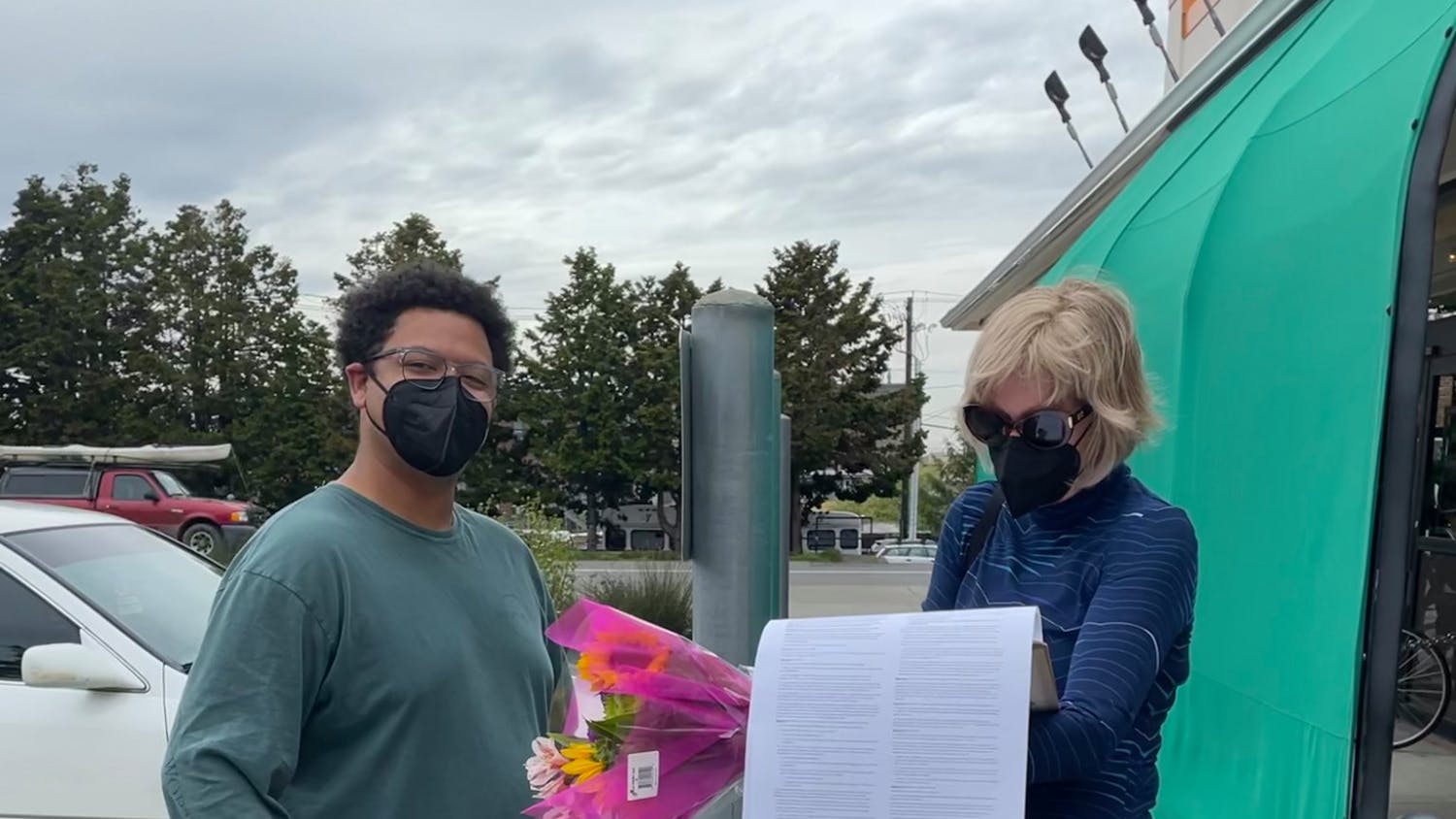Washington State’s 18-month-long eviction moratorium came to an end on Oct. 31, causing distress among Washington residents behind on their rent.
The most recent data available from the Whatcom Health Department in June said that 4,655 households were behind on their rent. Since the previous rent that had been accumulating since the moratorium was enacted was not waived, eviction cases can start piling up.
Despite Washington state receiving over $510 million in Emergency Rental Assistance from the Treasury Department, the rollout has been inconsistent. In King County, only $107 million of the $145 million in rental assistance available has been spent as of September.
“Depending on what county you’re in, there’s a lot of confusion about what’s going on,” said Edmund Witter, managing attorney for the Housing Justice Project in Seattle providing legal representation to tenants. “What’s the status of your application, how do you check on the status of your application, has the money been processed?”
Witter said there are a lot of “red tape” problems, intermixing bureaucratic confusion with bad communication. And since there is no longer any moratorium and many tenants are under the gun, a lot of problems are created for tenants that are hard to solve when facing eviction.
The exact data on how many households are facing eviction is also difficult to track.
“We’ve never had good eviction data to begin with,” Witter said. “Washington doesn’t require public filing [of evictions] until pretty late in the game. We never know how many tenants are behind on their rent or even get eviction notices.”
Witter said Washington state doesn’t require any public filings of lawsuits, just that you have to give the papers to the person you’re suing, leading to incomplete data on evictions. If someone who was issued a vacate notice already decided to leave, an invisible eviction happens with no public record of it.
“I’ve heard from landlords’ attorneys, and they say that they only file about half of the cases that they start,” Witter said. “Most of the cases that they start, the tenant moves out on their own. I’m not worried about the people we have contact with; I just don’t know about all of the people that we don’t talk to.”
Invisible evictions play a part in displacing people in Whatcom. John and his mother are tenants in Bellingham who had lived in their apartment for 20 years before being issued a notice to vacate last July by their new landlord. They’ve requested anonymity out of fear of retaliation by landlords and property management within the city.
“[The landlord] was actually honest, we have a letter from him that basically says we want more money than you have,” John said. “He was saying that he was going to contact the police if we didn’t leave. We became very close to becoming homeless as it was, but if we got an eviction attempt on our record we definitely would’ve become homeless.”
While a landlord is supposed to notify the court before they can call the police to proceed with an eviction, if an eviction attempt takes place, it stays on your permanent record and makes it incredibly difficult for low-income tenants to find another rental. Since John’s mother is disabled, it made it even more difficult for them to be able to move in just three months.
“We got a call from Regency Park that they had a two bedroom opening for us, but we had to wait until the end of November, and I asked the landlord if we could do that, and he said no, I will call the police,” John’s mother said.
Rental Assistance in Whatcom?
Washington allowed for different local governments to determine how they would allocate the rental assistance provided for them. In Whatcom County, $13.9 million was set aside in federal grants to assist tenants with rent, according to the Opportunity Council.
“We’ve distributed about $6 million of it to about 1,100 households,” said Lorena Shah, director of Opportunity Council’s Rental Assistance Program. “We’ve seen a surge in demand as eviction notices have begun to be issued again.”
Shah said they also don’t have a great sense of how many households are at risk for eviction — the number is fluid and constantly changing. While the Opportunity Council expects more federal money to come in, there’s uncertainty over whether it will be enough.
The two routes for getting rental assistance in Whatcom are either through direct scheduling with the Opportunity Council, which opens up weekly and fills up very quickly because of high demand, or a direct referral from the Eviction Resolution Pilot Program, which works in conjunction with the Whatcom Dispute Resolution Center to mediate rental disputes between landlords and tenants.
Rental Disputes and Legal Representation
Since Washington legislators passed SB 5160 in April, landlords are required to enter a dispute resolution process with their tenants before they can issue an eviction notice. If a situation involving non-payment of rent in Whatcom gets to this point, they are then referred to the Eviction Resolution Pilot Program.
“As of today we have received over 200 notices and there’s definitely been a surge of cases since November,” said Moonwater in an email, who is the director of the Whatcom Dispute Resolution Center. “Communication has frequently broken down between landlords and tenants.”
Witter said Washington State law requires landlords to give tenants notice of the availability of dispute resolution, and then the landlord has to give notice to the dispute resolution center that they gave their tenants that information, but that’s it.
“If tenants don’t show up to [mediation] or don’t respond to it, the [dispute resolution centers] give a certification that says the landlord tried and nothing happened, so it’s okay to proceed with an eviction,” said Tara Villalba, member of the Bellingham Tenants Union.
Villalba said mediation between tenants and landlords can be both intimidating and confusing.
“A lot of tenants are scared to show up,” she said. “I’ve been to these meetings pre-Covid, and it’s very intimidating to have your landlord there with whatever legal people or property managers they have and there’s you. Just you.”
An estimated 30%-50% of tenants don’t respond or show up to their resolution meetings. This is either because they aren’t aware of the resources in place, or are deterred from the stress of dealing with an eviction.
“We were told about the dispute resolution, and it was presented like an option that you could do if [your landlord] was a nice guy and he would consider your feelings,” John said. “It just did not seem realistic at all.”
SB 5160 also guarantees free legal counsel for low-income tenants in Washington. But with so many tenants facing eviction, there is only so much assigned legal bodies are capable of doing.
“Sometimes the landlord at some of the property management companies will send us all the notices that they sent out, and it will be a 200-page PDF,” Witter said. “Did you just basically paper all the tenants in your portfolio? I can’t keep up with that.”
Initiative 1 and Renter’s Rights
People First Bellingham proposed Initiative 1 to provide certain rental protections for Bellingham tenants that already exist in other parts of the state.
These protections included the expansion of rental relocation assistance when a landlord issues a no-cause eviction or increases in rent by at least 8%. Another protection was to require landlords to issue a 90-day notice of a no-cause termination or if they increase rent by at least 5%.
The final vote total for Initiative 1 was a razor-thin margin of 14,413 for and 14,781 against. While the initiative didn’t pass, the margin was so close that there is hope additional renter protections will be passed by the Bellingham City Council in the near future.
Villalba said that while there was a miniscule difference in the vote count, the ballot was turned down by voters because of a difference in the level of organization by landlords.
“Landlord organizations are much better resourced in terms of money and blocking initiatives like this,” she said. “There’s a story out there that ‘mom and pop landlords’ were going to get hurt by [Initiative 1]. Landlords were able to spin this story about them taking on a lot of risk to be landlords-- but the reality is, when it comes to homelessness, tenants face that risk much more than landlords do.”
She said since there are no caps on landlords’ ability to raise the rent, it creates a permanent situation of housing insecurity. Even with all the eviction’s protections in the world, landlords will still be able to displace their tenants if they decide to price them out.
“If [they raise the rent] again, we would probably be forced to move again, which is scary,” John said. John’s mother receives a housing voucher from the Bellingham Housing Authority, and it is barely enough to cover the cost of their new place.
The quality of the housing options left for John and his mother had significantly diminished. The place they were eventually able to find was at a price that was much higher than initially stated, and the compounding stress of the eviction and moving while being disabled caused her to become suicidal, eventually being admitted to a Crisis Triage Center.
“I’m having a very difficult time being here,” John’s mother said.
Here are resources for tenants in Whatcom:
Opportunity Council: oppco.org.
Whatcom Dispute Resolution Center: whatcomdrc.org/erpp.
LAW Advocates: lawadvocates.org.
Northwest Justice Project: washingtonlawhelp.org.
- Bellingham Housing Authority: https://bellinghamhousing.org/.
Jonathan Tall (he/him) started pursuing journalism at Western after getting his degree in Economics and Political Science. Interested in everything from international politics to environmental issues, you can find him reporting on city news or at the gym failing to deadlift way more than he’s able to.
You can reach him at jontall21@gmail.com










